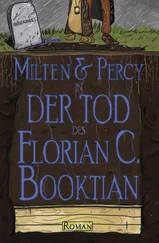So as you see, I remember a great deal about you. Right?
Ah, you smile your old smile.
Yet you prefer to look at the cemetery.
It makes a pretty scene today, don’t you think? All Souls’ Day. A pleasant feast for the dead: the women in the cemetery whitewashing the tombs, trimming the tiny lawns, setting out chrysanthemums, real and plastic, lighting candles, scrubbing the marble lintels. They remind me of Baltimore housewives on their hands and knees washing the white doorsteps of row houses.
A pretty sight, the bustling cluttered cemetery, the copper-penny-colored rain trees, the first fitful north wind blowing leaves every which way. If you listen carefully, you can hear the dry curlicues of crepe-myrtle leaves blowing up and down the paths like popcorn. When the wind shifts you catch a whiff of coffee and tar from the Tchoupitoulas docks.
In New Orleans I have noticed that people are happiest when they are going to funerals, making money, taking care of the dead, or putting on masks at Mardi Gras so nobody knows who they are.
Well, I found out who you are. Your profession, that is. A priest-physician. Which is to say, a screwed-up priest or a half-assed physician. Or both. Ah, I managed to surprise you, didn’t I? Yes, someone told me yesterday. But it is more than that. It was something I observed.
You were taking a shortcut through the cemetery. One of the women scrubbing the tombs stopped you to ask you something. Obviously she recognized you. You shook your head and moved on. But what could she have asked you? Only one thing under the circumstances. To say a prayer for the dead. An old custom here, particularly on All Souls’ Day. You turned her down.
So something went wrong with you too. Or you wouldn’t be here serving as assistant chaplain or substitute psychiatrist or whatever it is you’re doing. A non-job. Are you in trouble? Is it a woman? Are you in love?
Do you remember “falling in love,” “being in love”?
There was a time when I thought that was the only thing that really mattered. No, there were two things and two times in my life.
At first I thought “being in love” was the only thing. Holding a sweet Georgia girl in your arms and dancing to the “Limelight” theme in the Carolina mountains in the summer of ’52, out of doors, with the lightning bugs and the Japanese lanterns.
Later I became coarser or perhaps more realistic. I began to wonder if there was such a thing as “being in love,” or whether the best things in life might not be such simple, age-old pleasures as ordinary sexual intercourse and ordinary drinking. Indeed, what could be finer than to be a grown healthy man and to meet a fine-looking woman you’ve never seen before and to want her on the spot and to see also that she likes you, to invite her to have a few drinks in a bar, to put your hand under her dress, to touch the deep white flesh of her thigh, to speak into her ear, “Well, now, sweetheart, what do you say?” Right? No?
But that’s falling in love too, in a way, isn’t it? Yet very different. I wonder which is better. To tell you the truth. I haven’t quite sorted it out yet.
But certainly “love” is one or the other, no doubt the latter. Sometimes I think we were the victims of a gigantic hoax by our elders, that there was an elaborate conspiracy to conceal from us the one simple fact that the only important, certainly the best thing in life, is ordinary sexual love.
I “fell in love” with Lucy Cobb from Georgia and married her. Then she died. Then I “fell in love” with Margot and married her. She died too.
Would it surprise you if I told you that I might be falling in love again? With the girl in the next room. I’ve never seen her. But they tell me she was gang-raped by some sailors in the Quarter, forced to commit unnatural acts many times, then beaten up and thrown onto the batture. She won’t speak to anybody. And she has to be force fed. Like me she prefers the solitude of her cell. But we communicate by tapping on the wall. It is strange. Her defilement restores her to a kind of innocence.
Communication is simple when you are “in love.” Driving with Lucy Cobb through the Carolina summer night with the top down and the radio playing the “Limelight” theme, one could say to her simply:
“I like that, don’t you?”
And she could say: “Yes.”
With the girl in the next room it is the same. Yesterday I tapped twice.
She tapped back twice.
It might have been an accident. On the other hand, it could have been a true communication. My heart beat as if I were falling in love for the first time.
Then you know my story? I know it too of course, but I’m not sure how much I really remember. I think of it in terms of headlines: BELLE ISLE BURNS, BODIES OF FILM STARS CHARRED BEYOND RECOGNITION. SCION OF OLD FAMILY CRAZED BY GRIEF AND RAGE. SUFFERS BURNS TRYING TO SAVE WIFE. No doubt I read such headlines. I wonder why the headlines are easier to remember than the event itself.
Now I’ve begun to remember some things perfectly. It was seeing you that did it.
The first thing I remembered was the exact circumstances under which I discovered that my wife was deceiving me. But what did that have to do with you? Memory is a strange thing.
The next thing I remembered made more sense. I remembered the first time I had seen you since childhood. You were sitting in the fraternity house alone, drinking and reading Verlaine. That made quite an impression on me. I remember wondering whether you were not trying to make an impression. What kind of an act is that, I wondered. (It was a bit of an act, wasn’t it?)
Then this morning I remembered a great deal more. It was not as if I had really forgotten but rather that I didn’t have the — the what? — the inclination to think about the past. I had got out of the trick of doing it. Seeing you was a kind of catalyst, the occasion of my remembering. It is like the first time you look through binoculars: everything is confused, blurred, unfocused, flat; then all of a sudden click : distance drops away and there is everything in the round, bigger than life.
I think I began to remember by remembering our likenesses and our differences: we both lived in old houses on the River Road on the English Coast, I in Belle Isle, you in Northumberland.
Though we would never have admitted it, we regarded ourselves as an enclave of the English gentry set down among hordes of good docile Negroes and comical French peasants. Our families were the original Tory English colonials who accepted Spanish hospitality in Feliciana Parish to get away from the crazy rebellious Americans. But we were united less by a common history than by our dislike of Catholics and the Longs. We were honorable families.
You and I were also classmates, fraternity brothers, and later best of friends. We went to whorehouses. I understand young men don’t have to go to whorehouses any more.
There the resemblances stopped. Your family was rich so you went to prep school in the North. We were poor so I went to public high school. You were thin, withdrawn, and you drank too much, were said to be brilliant and to have the promise of a great future (did you?), yet you were obscure, almost unknown: when you graduated you didn’t know six people in the entire school.
I was the opposite: the type who reaches the peak of his life in college and declines thereafter: prominent on campus, debater, second-string all-S.E.C. halfback, Rhodes scholar, even “smart,” that is, a sort of second-echelon Phi Beta Kappa. Being “smart” on the football team meant that you read Time magazine and had heard of the Marshall Plan. (“You don’t believe he can tell you about the Marshall Plan? Ask him! He’s one more smart sapsucker.”) They, my teammates, admired “smartness” more than anybody I’ve met before or since.
Читать дальше












